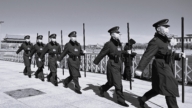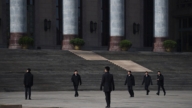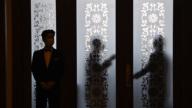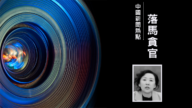【新唐人2012年7月23日讯】十八大前夕,中共当局整肃媒体动作频频。连日来,广东和上海两地的敢言媒体连续爆发高层震荡。其中,“南方报业传媒集团”更是收到“13个采访禁区”的文件﹔同时传出,“六四”前后,“南方集团”各下属报刊向中宣部递交的检讨书高达17份。分析指出,这是中共十八大前的维稳举措,也证明了中共当局所谓的政改只不过是一句空话。
今年5月,曾在中共喉舌《新华社》任职的广东省委宣传部副部长杨健,成为第一位空降“南方集团”的党委书记。
香港《明报》援引消息人士的话指称,杨健出任党委书记后,把“三报两刊”,也就是《南方周末》、《南方都市报》和《21世纪经济报导》,以及《南都周刊》、《南方人物周刊》,都纳入“审读”范围。
所谓“审读”,就是指内部专人把关的自我审查制度。在此之前只有《南方周末》和《南方都市报》需要审读。
广东政论作家朱健国:“实际上这次主要是因为十八大,再就是一个广东的经济严重滑坡带来的社会群体冲突的升级。在这种局面下,对媒体的打压就全面升级了。所以以前宣扬的民主,所谓政治体制改革,那都是空话。”
报导说,最近,上级宣传部门向“南方集团”正式下达了一份红头文件,列明13个采访禁区,将以往的口头禁令,升级为标准化的操作规范。
13个被禁止报导的议题包括:违背各级政策精神的议题,煽动所谓非法集会、结社、游行的议题,涉及包括民运和法轮功等“五类人”的议题等。内部文件指称,这13项内容只是审查重点,被禁止的议题不限于此。
前“北京大学新闻学院”副教授焦国标认为,这13项禁区恰恰是中共内部进行黑箱操作的地方,所以不希望有媒体去报导和揭露,也禁止公众去讨论和关注。
《中国青年报》的《冰点》周刊原主编李大同则表示,这些审查重点是中共当局维稳思路的体现,对于媒体人来讲早已经不新鲜。
原《冰点》周刊主编李大同:“它没什么新鲜的东西,十八大以前它加紧控制,也就是这样。这些东西任何媒体,任何时候都不许报。”
《明报》还透露,今年“六四”前后,“南方集团”各下属报刊先后总共向中宣部递交了17份检讨,远远高过往年的平均数,引起了内部员工哗然。
在此之前,《南方人物周刊》发表了对缅甸民运领袖翁山苏姬的专访,以及60年代大饥荒亲历者的口述历史,但这些报导被认为是在挑战国家政策。“南方集团”开始派人专门“审读”内容,并明确要求周刊“不要给别人抓把柄”。
7月初,海内外瞩目的四川甚邡爆发示威的一星期内,原本敢言的“南方集团”刊物,完全没有提及甚邡事件。消息指称,当时总共有8篇稿件被“枪毙”,不得刊出。
对于“南方”报系自我审查和噤声的行为,焦国标引述了柏林围墙被推倒后,审判东德警察时的“最高良知原则”—-“把枪口抬高一厘米的主权”。
前“北京大学新闻学院”副教授焦国标:“媒体记者在处理版面和选题的时候,他也有他的一厘米的主权。把这个一厘米的主权使用起来,就足以把中宣部的种种禁令给它冲倒。就是每一个媒体人都要善于、勇于使用自己的一厘米的主权。”
此外,由于发表触动当局敏感神经的文章,广州《新快报》在7月16号关闭多个新闻版面,并宣布总编辑陆扶民被撤职。17号,上海《东方早报》社长陆炎也被免职,副主编孙鉴则遭到停职。
采访/易如 编辑/李明飞 后制/周天
Communist Regime Internal Regulatory Document Lists 13 Censored Topics
As the 18th National Congress approaches,
the Communist regime carries out frequent purging activities against the media.
For days, outspoken media in Guangdong and Shanghai
experienced sequential shocks from the authorities.
Among them, the Nanfang Daily Press Group received
regulatory documents listing 13 censored topics after submitting
up to 17 self-critique reports to the Central Propaganda
Department around June 4 (Tiananmen Movement memorial).
This stability maintenance initiative prior to the National
Congress further confirms the so-called political reform is only an empty promise of the Communist regime.
This May, Yang Jian, Vice Minister of the Propaganda
Department of Guangdong,became the first Party Secretary of the Nanfang Daily Press Group promoted from elsewhere.
Hong Kong’s Ming Pao Daily News reported that
as the Party Secretary, Yang Jian quickly ordered review processes of three newspapers and two magazines under the Nanfang Daily Press Group.
The “review” process refers to the internal censorship
controlled by an appointed person. Prior to this, only two newspapers, the Southern Weekend
and Southern Metropolis Daily, were under regulation.
Guangdong political commentary writer, Zhu Jianguo:
“The upcoming 18th National Congress and the increasing social conflict under the severely damaged economy in Guangdong have led to the escalated suppress of the media. The democracy and political reform previously preached
were therefore meaningless."
It is reported that the CCP internal confidential and regulatory
document usually in red headings was issued to the Nanfang Daily Press Group.
With “13 Censored Topics”, this document officially
standardized the regulation formerly known as only verbal orders.
The 13 censored topics include the issues
that run against policies at any level,
that incite unlawful assembly, association, and procession,
that are related to pro-democracy movement and Falun Gong.
It is also alleged that censored topics are not limited to
the 13 focus points in the internal documents.
Jiao Guobiao, former associate professor of
School of Journalism, Peking University, believes that
the 13 censored topics are areas the CCP operate in black box.
The CCP would not allow any report and disclosure
by the media. They are also prohibited from public discussion and awareness.
Li Datong, former editor of the Freezing Point,
a weekly supplement of the China Youth Daily, indicates that
the Review process presents the CCP’s intention to maintain
stability and serves no surprise to the journalists.
Li Datong, former editor in chief of Freezing Point: “Tightened
control prior to the National Congress is nothing new.
None of these are allowed to be reported by any media
at any time."
Ming Pao Daily News also revealed that around June 4th
(the Tiananmen Massacre memorial), subsidiaries under
the Nanfang Daily Press Group submitted a total of
17 self-critique reports to Central Propaganda Department.
This high volume shocked the employees
of the Nanfang Daily Press Group.
Prior to this, the Southern People Weekly had
a special report based on an interview with
Burmese pro-democracy leader Aung San Suu Kyi, and
a witness’s oral history of the great famine of the 1960s.
Both reports were considered challenges to national policies.
The Nanfang Daily Press Group therefore specified
a specialist to “review” the content and clearly requested the Weekly not to “give a handle to others.”
For a whole week when the shocking Shifang protest occurred,
the outspoken Nanfang Daily Press Group
did not publish article about the Shifang incident.
It was alleged that a total of 8 articles were killed
during that time.
Jiao Guobiao shared his opinion of Nanfang’s self-censorship
behavior by referencing the “aiming the gun 1cm higher as dictated by your conscience” that the judge told the Ingo Heinrich case
after the Berlin Wall was torn down.
Jiao Guobiao, Former Peking University School of Journalism
Associate Professor: “The journalists also have their own rights of 1cm when dealing with the forum and topic.
This 1cm right is powerful enough to break down the
prohibition from the Central Propaganda Department.
Every journalist should fully operate his 1cm right.
In addition, on July 16, Guangzhou New Express Daily
closed a number of news pages due to its published articles
that touched the sensitive nerve of the authorities.
The editor-in-chief, Lu Fuming, was dismissed.
On 17 July, Lu Yan, president of the Shanghai Oriental
Morning Post was removed from the office, and Sun Jian, the deputy editor, was suspended.

























